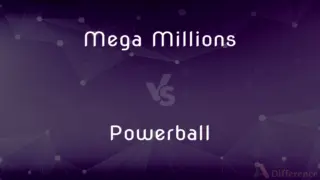Chemical Fertilizer vs. Organic Fertilizer — What's the Difference?
Edited by Tayyaba Rehman — By Fiza Rafique — Published on December 1, 2023
Chemical fertilizers are man-made inorganic compounds, while organic fertilizers are naturally derived from plant or animal sources.

Difference Between Chemical Fertilizer and Organic Fertilizer
Table of Contents
ADVERTISEMENT
Key Differences
Chemical fertilizers are synthesized in labs and factories, while organic fertilizers are sourced from living organisms.
While chemical fertilizers often provide quicker nutrient release, organic fertilizers release nutrients more slowly and improve soil structure.
The use of chemical fertilizers can sometimes harm the environment due to runoff, while organic fertilizers tend to be more eco-friendly and sustainable.
Chemical fertilizers focus primarily on macronutrients, whereas organic fertilizers offer a broader range of nutrients, including micronutrients.
Overreliance on chemical fertilizers can deplete soil health over time, while organic fertilizers can enhance soil fertility and microbial activity.
ADVERTISEMENT
Comparison Chart
Source
Synthesized in labs/factories
Derived from natural living organisms
Nutrient Release
Quick release
Slow, sustained release
Environmental Impact
Can lead to harmful runoff and pollution
More environmentally sustainable
Nutrient Composition
Primarily macronutrients
Includes both macro and micronutrients
Effect on Soil Health
Can deplete soil health with overuse
Enhances soil fertility and microbial activity
Compare with Definitions
Chemical Fertilizer
A commercially produced substance for plant nourishment.
Using chemical fertilizer, the farmer hoped to increase his harvest.
Organic Fertilizer
Plant or animal-based materials used to enrich soil.
His roses thrived when he used an organic fertilizer.
Chemical Fertilizer
Industrial compounds designed to provide plants with essential nutrients.
The garden was lush due to the chemical fertilizer.
Organic Fertilizer
A sustainable and eco-friendly option for plant growth.
For an earth-friendly choice, she went with organic fertilizer.
Chemical Fertilizer
Lab-created nutrients for optimizing plant development.
She opted for chemical fertilizer to ensure her flowers bloomed quickly.
Organic Fertilizer
Naturally occurring compounds that support plant health.
Organic fertilizer helped rejuvenate the worn-out garden soil.
Chemical Fertilizer
Man-made inorganic materials used to nourish plants.
With chemical fertilizer, the plants grew faster.
Organic Fertilizer
A natural source of nutrients for plants from decayed organic matter.
The compost heap provided an excellent organic fertilizer.
Chemical Fertilizer
A compound synthesized to enhance plant growth.
Farmers use chemical fertilizer to boost crop yields.
Organic Fertilizer
A substance derived from living organisms to nourish plants.
She prefers organic fertilizer for her vegetable garden.
Common Curiosities
Do Organic Fertilizers improve soil structure?
Yes, organic fertilizers can enhance soil structure and microbial activity.
Which provides faster nutrient release, Chemical Fertilizer or Organic Fertilizer?
Chemical fertilizers usually provide quicker nutrient release than organic fertilizers.
Can overuse of Chemical Fertilizer harm the soil?
Yes, overreliance on chemical fertilizers can degrade soil health.
Are Chemical Fertilizers better than Organic Fertilizers?
Both have their advantages, but chemical fertilizers can deplete soil health over time, while organic fertilizers can enhance it.
Which type of fertilizer, Chemical or Organic, is more sustainable?
Organic fertilizers are generally considered more sustainable and environmentally friendly.
How do plants react to Chemical Fertilizer compared to Organic Fertilizer?
Plants often show faster growth with chemical fertilizers, but organic fertilizers provide a broader range of nutrients and benefits to the soil.
Do Organic Fertilizers contain chemicals?
While derived from natural sources, organic fertilizers can still contain naturally occurring chemicals.
What is the primary source of Chemical Fertilizer?
Chemical fertilizers are primarily sourced from man-made inorganic compounds.
Are Organic Fertilizers made in labs?
No, organic fertilizers are derived from natural living organisms, not synthesized in labs.
How do Chemical Fertilizers impact the environment compared to Organic Fertilizers?
Chemical fertilizers can lead to harmful environmental runoff, while organic fertilizers are more eco-friendly.
How are Chemical Fertilizers produced?
Chemical fertilizers are produced in factories using various chemical processes.
Are all Organic Fertilizers completely safe?
While generally safe, it's essential to use any fertilizer, including organic ones, as directed to avoid plant burn or other issues.
Are Chemical Fertilizers always synthetic?
Yes, chemical fertilizers are synthesized and are considered inorganic compounds.
Which type of fertilizer, Chemical or Organic, provides more micronutrients?
Organic fertilizers often provide a broader range of nutrients, including micronutrients.
Can Organic Fertilizers be used in any garden?
Yes, organic fertilizers can be used in any garden and are especially popular in organic farming.
Share Your Discovery

Previous Comparison
Mega Millions vs. Powerball
Next Comparison
Strategic Planning vs. Strategic ManagementAuthor Spotlight
Written by
Fiza RafiqueFiza Rafique is a skilled content writer at AskDifference.com, where she meticulously refines and enhances written pieces. Drawing from her vast editorial expertise, Fiza ensures clarity, accuracy, and precision in every article. Passionate about language, she continually seeks to elevate the quality of content for readers worldwide.
Edited by
Tayyaba RehmanTayyaba Rehman is a distinguished writer, currently serving as a primary contributor to askdifference.com. As a researcher in semantics and etymology, Tayyaba's passion for the complexity of languages and their distinctions has found a perfect home on the platform. Tayyaba delves into the intricacies of language, distinguishing between commonly confused words and phrases, thereby providing clarity for readers worldwide.












































